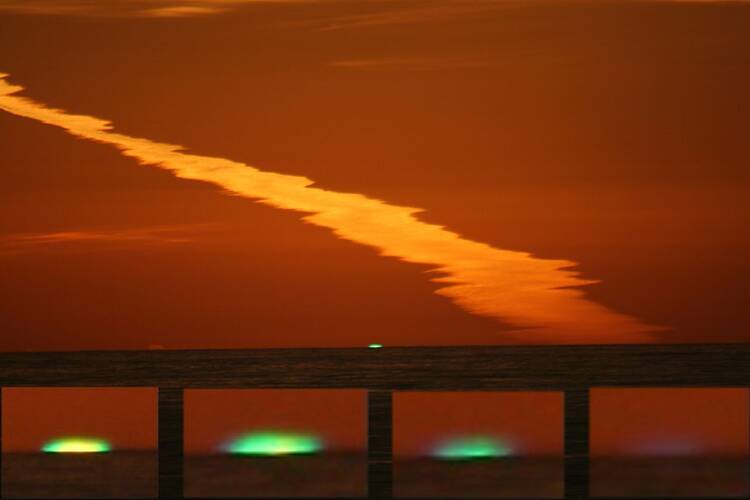When you live beside the Pacific Ocean, it is almost instinct to stop whatever you’re doing near dusk and watch the sun slowly disappear. In Angeleno beachside communities like Santa Monica or Hermosa Beach, crowds gather even on a weekday just to see our distant star slip once more beneath the horizon, suffusing sea and sky in creams and pinks and purples. Most evenings there aren’t even clouds for the setting sun to transform into sheets of orange and gold. But no matter; the moment of sunset draws us like iron to a magnet.
But amid the crowds one also finds ordinary people scrutinizing the horizon with the keen eye of a scientist or an ancient farmer. They murmur about weather conditions, the purity of the air, the clarity of the horizon. A particular term recurs that to the uninitiated sounds like the latest in Hollywood’s endless pantheon of superheroes. In fact, it is the name of a meteorological phenomenon—the green flash.
As the sun approaches the horizon, its rays become slightly dispersed by the earth’s atmosphere. As through a prism, its wavelengths are divided and darker colors are freed. The indigo we cannot see, nor usually the blue. But sometimes in the sun’s final moments, when the air is quite clear, green light can be seen creeping in around its edges to finally form a momentary spot of viridescence in the space where it had just been.
In 1838 Captain George Back of the H.M.S. Terror offered one of the earliest descriptions of the green flash. As he traveled in the Arctic, Back looked to the east: “I had observed the upper limb of the sun, as it filled a triangular cleft on the ridge of the headland, of the most brilliant emerald colour,” he wrote.
The French author Jules Verne gave the phenomenon a whole mythology, explaining in his 1882 novel The Green Ray that if you saw the green flash, it gave you special powers of perception. “At its apparition all deceit and falsehood are done away, and he who has been fortunate enough once to behold it is enabled to see closely into his own heart and to read the thoughts of others.” (Ironically, at the very moment two of his characters are finally present for a green flash, they are so caught up in the realization of each other’s beauty that they miss it entirely.)
Other wild stories have been concocted about the green flash, like the one told by Admiral Robert Byrd, who said in 1929 that he saw one in Antarctica go on for over half an hour (which would have required either time or the planet to stop). But what’s truly strangest about the green flash is that some people seem to be completely unable to see it. Maybe it’s some slight and otherwise undetectable colorblindness; maybe they just don’t realize what they’re seeing or don’t know where to look. The term “green flash” is certainly deceptive; it’s not a flash at all but a small and subtle ball of light.
Whatever the explanation, on a lovely Southern California evening a group can relish together a sunset, yet when that final slice of disc hits the horizon some may “ooh” and “ahh,” while others can only look on, bemused. No doubt there’s a metaphor in here about our capacity for wonder—the way maturity shrivels the human imagination, our willingness to see the beauty in our world.
But in this season of political wrangling, what seems more striking is how much reality itself has become like the green flash—readily demonstrable, yet still contested. Pundits argue whether climate change exists, no matter that these last 15 years have been the hottest on record. The escalation in U.S. gun violence is measurable—and denied. Minorities tell story after story of police brutality, even provide compelling evidence of it; yet rarely is an officer charged with an offense, let alone convicted. In Los Angeles County alone, over 375 people were shot by the police between 2010 and 2014. Twenty-five percent were unarmed, and not a single police officer was charged. No officer here has been publicly prosecuted for an on-duty shooting since the turn of the century.
Despite its name and elusiveness, the green flash is not magic but meteorology. Still, it’s hard today not to wish for a strange sunset flash of light that could strip away all obfuscation and lay bare the truth.








